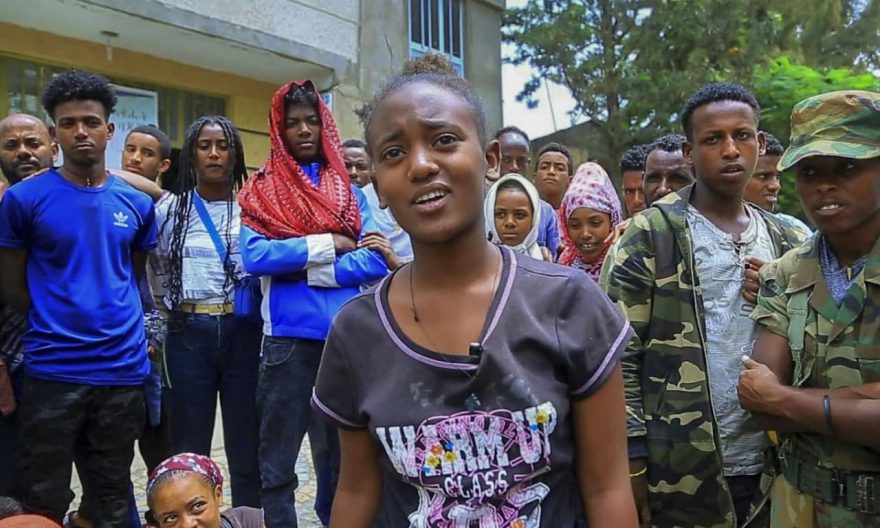
BY JEFF PEARCE
Part two
It’s not just the TPLF that is pursuing Psy-Ops in the conflict either. It’s also the U.S. government.
“The U.S. calls for de-escalation of the fighting even when the ENDF are not in Tigray are one part of it,” says Franks. “But the U.S. military, through Western media organizations, is engaged in a hostile campaign of Psy-Ops against the Ethiopian people to weaken their morale, soften their discipline, and erode trust in the federal government.»
The greatest target of these will be the Amhara people since they are on the frontlines in Welkait and Humera mobilizing in constitutional militias and working closely with federal forces.
“The Western media will do everything to erode trust in Abiy. They’ll make every necessary, though unpopular, strategic decision by Abiy — that would ultimately serve Ethiopia’s people — appear as though it’s a failure and done from a position of weakness. They’ll take advantage of Abiy’s patience, silence, and concerns for human life. They’ll fill every lull in Ethiopian media coverage with their own propaganda. The latest front-page article in the New York Times by Declan Walsh is effectively a loud announcement of this new reality. The U.S. is essentially telling Ethiopians and especially Amhara: ‘We’re going all in on our TDF allies who will obviously win this war.’ “And as they ‘capture’ less strategically important towns in Tigray, the Times and the TPLF Twitter warriors will be right there to convince everyone that a TDF victory is inevitable. They don’t care if they broadcast the use of ‘child soldiers’ and reprisal killings since this is, again, a form of Psy-Ops that suggests that TPLF and their US backers will stop at nothing to achieve their objectives. Al Shabaab and ISIS work the same way.”
Reinforcing these tactics, he says, are articles like the one de Waal wrote endorsing the TPLF’s pre-conditions for the ceasefire. It was no accident that this piece followed de Waal’s puffing up of Tsadkan as some kind of military genius —Which is a hell of a stretch. Before Tsadkan left his post as Chief of Staff for the Ethiopian armed forces, he only saw one major operation, which was the conflict with Eritrea — not exactly a clear winner for that debacle. He later served for at least five years as a senior adviser — paid for by the UK government — to the Sudanese People’s Liberation Front… which by the way, worked for the contract firm, Adam Smith International.
Incidentally, General Tadesse Werede, Tsadkan’s current co-lead general in Tigray, was also paid by UK “development” funding through ASI for work in the Sudans.
The scuttlebutt is that several individuals working in South Sudan back then noticed the future “rebel mastermind” Tsadkan didn’t spend a lot of time in South Sudan even though he was paid an inordinate daily rate for full-time consultancy services. Little wonder why the UK has been reticent to speak out against a group which, in terms of its senior command structure, they paid, trained and educated. Tsadkan? “One of the finest military strategists of his generation in Africa?”
Some genuine African military officers might ask you how much khat you’ve had tonight.
“But he [de Waal] is providing what’s called ‘augmentation’ for the insurgents,” cautions Franks, “and this is meant to deflect from their heinous crimes by trying to give their leader credibility. And the piece on ceasefire pre-conditions — that’s a classic ‘game theory’ move. You’re first to the plate, and so what’s called your ‘dominant strategy’ remains the ‘best’ possible outcome no matter what amendments is requested in the negotiations.”
So it’s reasonable to ask… What’s the countermove to all this? Franks and Kakoiba appear to agree.
“Pull back,” says Kakoiba. “Reassess. They need to better anticipate how counter-insurgency tactics will work near the border areas [with both the Amhara Regional State and the international boundary with Eritrea]. Knowing TPLF tactics, it’s a foregone conclusion that they will use children — they will kill children — and blames the Amharas. They will also penetrate towards Eritrea and continue, in all places, using the stolen uniforms and videoing and blaming the ENDF and EDF.”
“The TPLF only has minimal military hardware — certainly not enough to mount any sort of conventional force against the rest of the federal army,” says Franks. “Because of this, de Waal and Tronvoll will get more histrionic. You can expect more Psy-Ops. Look at the pattern. First, an atrocity gets screamed about on social media, and then it’s ‘validated’ by mainstream newspapers and networks, which of course, go to the analysts like de Waal and Tronvoll to comment, and around and around we go.”
There is clearly no bottom for the TPLF Psy-Ops brigade and its Western media enablers.
Take for instance the “video obtained by the Associated Press and smuggled out of Tigray days later” (three guesses where they obtained it from). In the story published today, a 16-year-old girl from the video is identified as “Meron Mezgeb, Student.” Here is how AP quoted her: “I came here because I saw girls like me being raped” by combatants, she said. “I actually wanted to go (fight) at the beginning but I was told I was too young. But because I saw my comrades come, I came here to fight alongside them.”
Not once does the AP remark on the fact that this is open use of child soldiers, a contravention of international law. Nor does the reporter bother to get a comment from a UN official or even an analyst on the clear use of child soldiers. Instead, we get more “journalistic stenography” from the TPLF perspective.
A graphic with Meron Mezgeb’s face, taken from a still of the video, has already been mocked up and shared online.
The individual posting this had a remark of their own: “If I am old enough to get raped, I am old enough to fight.”
Yeah, turn that one over in your mind for a while. And how horrible it is to exploit children like this, and to put weapons in their hands? This is what Ethiopia is up against. This is what the U.S. is defending.
But if Abiy acts strategically, say Kakoiba, he’ll keep his federal troops behind the contested border lines. People should recall that Ethiopia’s prime minister promised those lines wouldn’t be debated on until after the conflict.
Ethiopia’s Amhara people, however, are pissed. And they’ve got a case, as incidents of ethnic cleansing even before Tigray racked up a depressing body count, and subsequent incidents all during the conflict have still been mostly ignored by the Western media.
Abiy will need to placate the Amhara with the promise that restoring the original boundary lines will be a priority agenda item after the Tigray crisis is resolved.
But this will also mean the international humanitarian community will have to wake up to the monster it chose to lie down with. It demanded a ceasefire; it got one. Now it’s wedded to a beast partly of its own creation, one it helped supply with food, with safe sanctuary for TPLF fighters, and, in all probability, smuggled weapons. When the hangover hits, it’ll be a doozy, and there won’t be any federal forces around to blame anymore.
That’s why Kakoiba says, “Seal the borders.” He suggests Eritrea may well request the African Union deploy a force of military observers to patrol its border with Tigray, and that could soon exhaust the insurgency.
“Ethiopia has made it thus far — against the odds — since the TPLF cowards attacked the Northern Command back in November,” says Dawit Tesfaye. “Even when they cross the Tekeze and engage in guerilla tactics in ‘Western Tigray,’ all Ethiopians must understand that they will not unseat Eritrea and Amhara-backed ENDF positions there. First, this is the Golan Heights of the region whereby those who control the strategic positions there will ultimately control the broader region. Second, this is also spiritual warfare for the Amharas who are fighting for their land, dignity, and identity.
“The more the locals suffer under TPLF assaults, the more the ranks of the Amhara militia will swell with impassioned fighters with a deeper sense of purpose and morale. Third, the TPLF is totally encircled. Some arms will inevitably enter into Tigray, but for the most part, the TPLF is choked off from meaningful supply lines and is greatly weakened to the point of being castrated. Last, the TPLF is not fighting a ‘just war.’ They are cruel and bound by neither morality nor principle but rather led by dishonest, opulent leaders who are detached from the masses and who depend on external forces for their survival rather than their own people. For these reasons, the Ethiopian people should be confident in themselves and their leaders.”
Tesfaye advocates patience. All Ethiopians should “refrain from believing every passing rumor spread on social media and in the Western press. A strategic retreat and silence does not equal defeat. Stop the defeatism. War is complex and the devil is in the details. How many times have rumors promoted by the New York Times and the TPLF been proven false one day, week or month later? How many times have seemingly bad moves by federal forces been proven wise after the fact?
“Twitter is a medium designed to focus on the individual, which reflects Western tradition. However, the Ethiopian tradition and culture is one that focuses on the collective community, discipline, and patience with leadership. In these perilous times in which psychological warfare is intense, this Ethiopian tradition must come into play.”
“The rest of Africa is watching,” says Andrew Kakoiba. “They know very well what the U.S. and EU are doing, and they don’t want to be next. Remember last year when the analysts talked about a regional conflict? They’ve practically ensured one, but not the way they wanted or expected. This will bring Africans together, and I promise you, the Westerners won’t like it.”
Editor’s Note: The views entertained in this article do not necessarily reflect the stance of The Ethiopian Herald
The Ethiopian Herald July 17/2021



